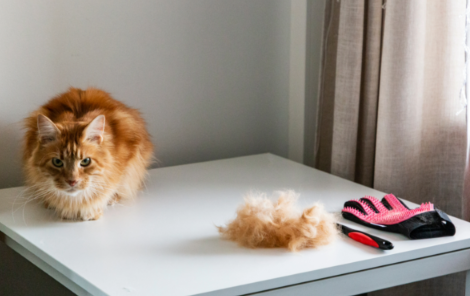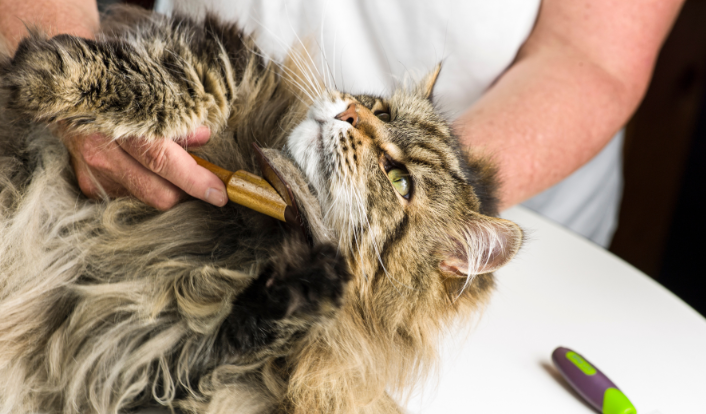Understanding the Causes of Hairballs in Cats
Maine Coon cats are known for their long, luxurious coats. While this is one of the characteristics that make them so beloved, it can also lead to a common issue among many cat breeds – hairballs. Hairballs occur when a cat ingests too much fur while grooming themselves, and the fur becomes compacted in their stomach instead of passing through the digestive tract.
The Importance of Preventing Hairballs
Cat Hairballs can be more than just an annoyance for both you and your Maine Coon cat. They can also cause serious health issues if left untreated. When hairballs become too large, they can block the digestive tract and lead to vomiting, loss of appetite, and even intestinal blockages. This is why it’s crucial to take
Recognizing Hairball Symptoms
As a responsible cat owner, it’s essential to keep an eye out for any signs of hairballs in your Maine Coon. Some common symptoms include frequent vomiting, constipation, and lack of appetite. If you notice any of these signs, it’s best to consult your veterinarian for proper treatment.
Prevention Tips
Fortunately, there are several ways you can help prevent hairballs in your Maine Coon cat. One effective method is regular grooming. By brushing your cat’s fur daily, you can remove loose and excess hair before they have a chance to ingest it while grooming themselves.
Another helpful tip is to provide your cat with a specialized diet that helps reduce the buildup of hairballs. These diets typically contain high levels of fiber that aid in
Natural Remedies for Hairball Prevention

If you prefer to take a more natural approach, there are also some home remedies that may help prevent hairballs in your Maine Coon. Adding a small amount of canned pumpkin or olive oil to your cat’s food can help lubricate their digestive tract and ease the passage of hairballs.
You can also try incorporating more moisture into your cat’s diet by feeding them wet food instead of dry kibble. This will help ensure that their digestive system is properly hydrated, making it easier for hairballs to pass through.
Maintaining Proper Hydration and Dietary Habits for Your Maine Coon
A common issue among Maine Coon cats, and while they may seem like an innocent annoyance, they can actually lead to serious health issues if not properly managed. Fortunately, there are steps you can take to prevent hairballs from forming in the first place.
One key aspect is maintaining proper hydration levels for your cat. Make sure they have access to fresh, clean water at all times, and consider incorporating wet food into their diet as well. This will help keep their digestive system hydrated and functioning properly and prevent diarrhea in cats.
In addition, it’s important to pay attention to your cat’s dietary habits. A diet high in fiber can help promote regular bowel movements and prevent hairballs from forming. You can also try adding small amounts of cat grass.
Proper hydration improves overall health, in their immune system, gastrointestinal tract, or intestinal tract. When you prevent hairballs in cats you prevent heart disease, reducing the risk of other health problems. It’s always a good idea to consider all these factors in Maine Coons and Persian cats.
Herbal Supplements and Over-the-Counter Solutions for Cat Hairballs
hydration, there are also various herbal supplements and over-the-counter solutions available to help manage hairballs in cats. These can range from natural remedies such as pumpkin or coconut oil, to specialized hairball control treats or pastes.
When considering these options, it’s always important to consult with your veterinarian first. They can provide guidance on the best course of action for your specific cat based on their individual needs and health history.

Grooming Techniques to Minimize Hairballs
Regular grooming is important for preventing hairballs. It also helps improve the digestive health of your Maine Coon. Brushing your cat’s coat regularly can help remove loose fur before they have a chance to ingest it while grooming themselves. This is especially important for long-haired breeds who are.
Conclusion
Hairballs can be a common, yet unpleasant issue for cat owners. However, proper management and preventive measures can easily control them. You can reduce hairballs in your cat with diet changes or regular grooming. There are many ways to help your furry friend.
Always talk to your veterinarian for the best advice on managing hairballs for your cat. With a little extra care and attention, you can keep your cat healthy and happy, free from pesky hairball problems.
Hairballs are a common issue for Maine Coon cats, but with proper prevention methods, they can be easily managed. Regular grooming, specialized diets, and natural remedies can all play a role in keeping your cat happy.

